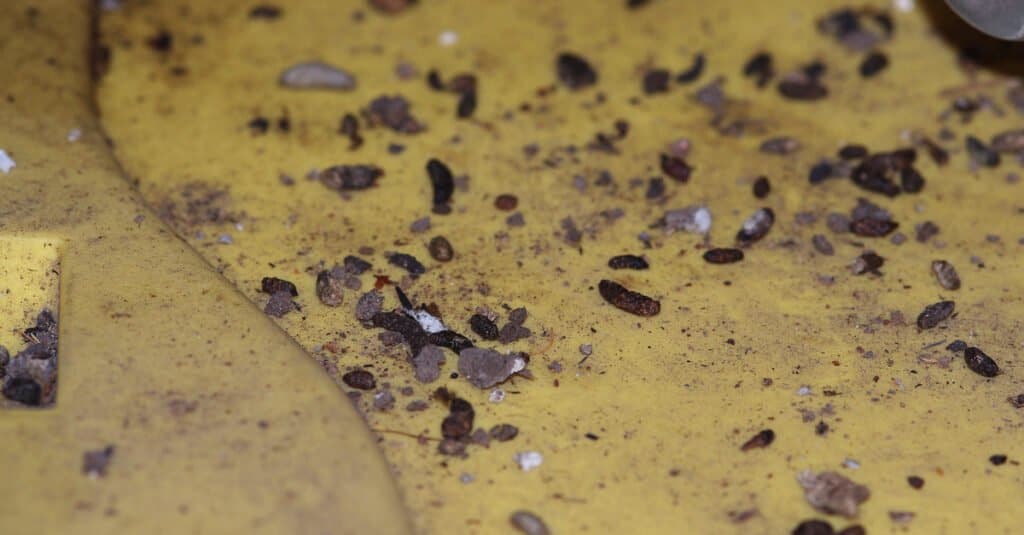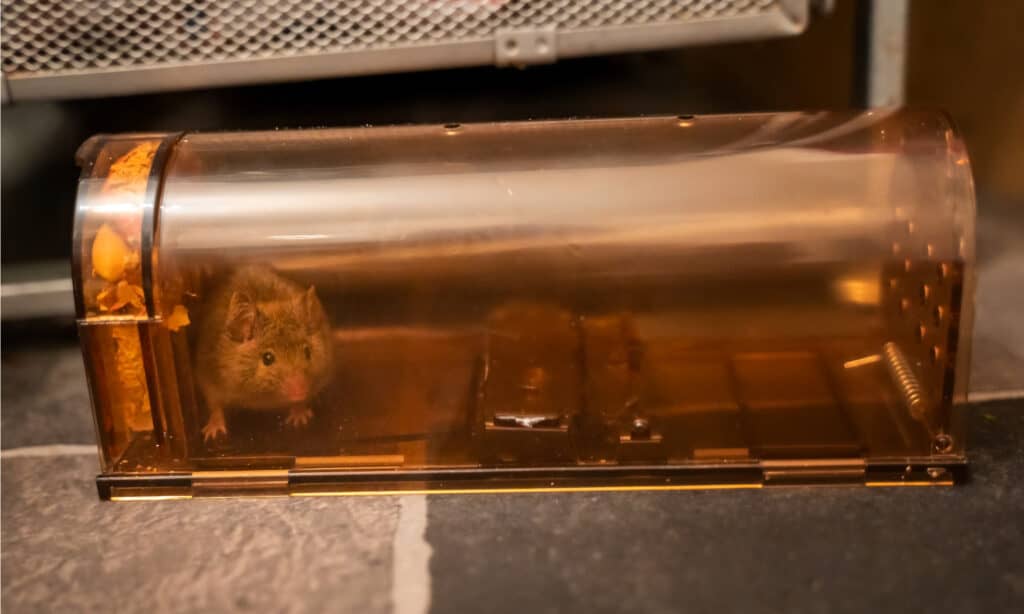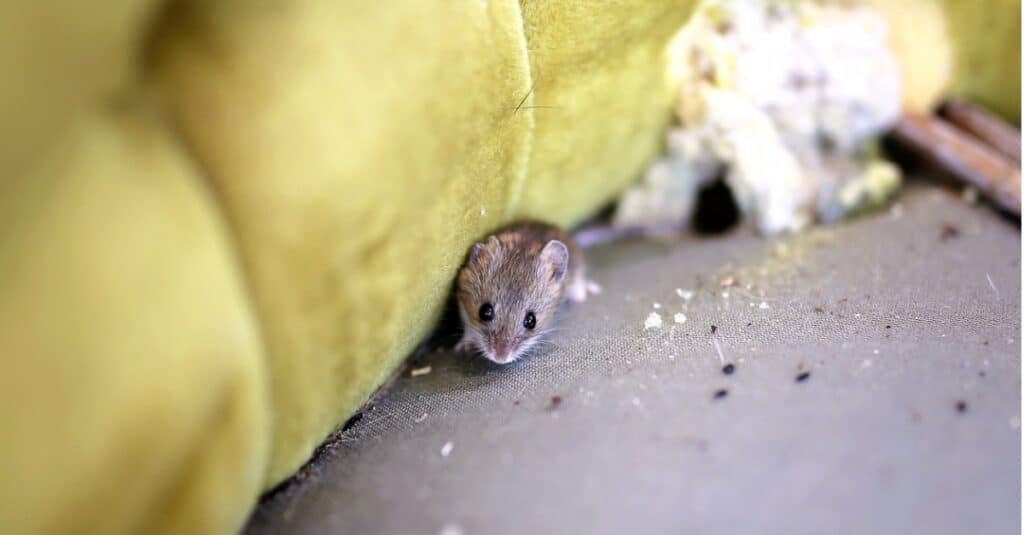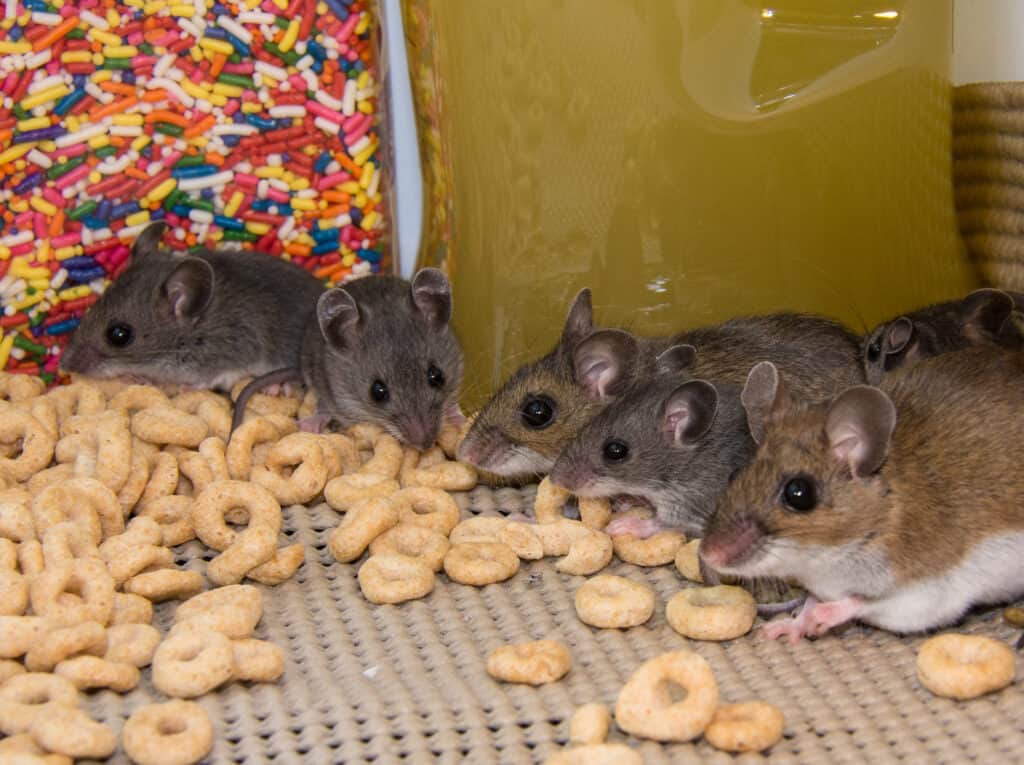You hear scampering sounds inside your walls. Next, you find bits of your couch cushion missing. Then, you see a small furry critter scurrying away out of the corner of your eye. Mice have infiltrated your home. How do you know if you have a serious mouse infestation and what do you do first? Today, we’re going to provide you with a helpful overview of what steps you can take when mice invade your home.
By the time we’re finished, you’ll know exactly how to handle a mouse infestation by yourself or with a little help.
How Can You Tell if You Have a Severe Mouse Infestation?

Mouse infestations leave behind a lot of poop
.
©Photo – TMD/Shutterstock.com
We’ve already talked a little bit about how to recognize a mouse infestation. However, we need to identify the most common factors that are present in a severe mouse infestation.
Look for the following signs that you have a mouse infestation:
- You see mice in your home. Although it may seem obvious, you should know that you have a greater chance of seeing mice in your home if there are more than a few of them.
- You find droppings and urine. Mice droppings appear as small blackish brown or gray grains of rice. Mice leave between 50 and 75 pellets each day. Their droppings don’t emit an odor, but their urine smells like ammonia. If you see a lot of these pellets in hidden areas in your home, like cabinets, you probably have a serious infestation.
- You find nests. Mice make nests to keep them warm and safe but also to raise their young. Their nests are made of paper, plant matter, and fabric. If you find several of them, then you have a lot of mice in your home already. Also, you should know that mice can have between 30 and 70 babies per year.
- You hear mice moving around. Mice tend to be most active between the hours of dusk and dawn. You can hear them moving along in your home and even inside your walls
- You discover ruined food. Mice want your home’s food and shelter. If you find a mess in your pantry, like boxes of cereal chewed open, then you probably have mice.
These signs alone don’t mean you have a severe infestation. You’ll see all these signs but widespread and severe. Finding several nests, hearing constant scurrying and squeaking, and seeing lots of food ruined prove a severe infestation.
What to Do First with a Severe Mouse Infestation

Although you can use
humane mouse traps
, you’re better off using deadly ones.
©lortek/Shutterstock.com
The first thing you can do with a severe mouse infestation is either call a pest control specialist or begin laying deadly spring traps to kill the mice in your home. You have to decide if you are ready and willing to handle the mice yourself or if you would rather leave this task to professionals.
Obviously, if you are going to call in a pest control specialist, they’ll handle everything for you. Just contact a reputable, effective pest control specialist, and you’re set. However, if you’re going to handle this project yourself, then you should continue reading. We’ll give you some helpful advice in stopping a severe mouse infestation from getting worse.
The most important thing you can do is act fast to stop an infestation from getting worse. Like we’ve said, mice breed very quickly. A single female mouse can have up to 70 babies in a year in some cases. These mice become mature at six weeks of age and can start the cycle all over again.
How to Get Rid of Mice in a Severe Infestation

You need to end a mouse infestation before it gets worse.
©iStock.com/ChristinLola
If you have a severe mice infestation, follow these steps to get ahead of it. These simple steps can help you end the infestation.
1. Lay Mouse Traps the Right Way
Mouse traps are the best way to fight against a severe mouse infestation. You’ll want to consider using three different types of mouse traps in particular. They include:
- Snap traps, the classic wood traps that you bait
- Glue traps that trap mice that wander onto them
- Electric bait traps that instantly shock and kill mice
These are the best traps for the job, but some people may insist on using humane traps for catching and releasing. Those won’t help as much as deadly traps in an infestation situation.
Also, you must lay the traps the right way. Put them perpendicular to the wall, with the bait facing the wall. That way, the mouse only triggers the trap in such a way that the snapping part can strike them. Otherwise, the mouse can activate the trap and keep going unscathed.
2. Use Bait Stations to Poison Mice
Mice are attracted to food, and you can use that against them. Get professional mouse poison chunks and pellets. These packets attract mice, and they’ll gladly chew into the packets containing the poison and die.
Mouse poison does not always work, though. It can take several doses to kill the mice. Also, you do not want to use poison in your home with certain pets or children present. Using salt as poison to kill mice is a very ineffective method.
3. Find Out How They’re Getting Inside and Close Them Out
Once you have your traps and bait down, it’s time to figure out how the mice are getting into your home. You need to stop the influx of mice, or you’ll have another infestation in a few short months.
Look for small holes around the base of your home, near the roof, or by doors. Remember that mice can fit into holes the size of a dime even as adults. Once you find the way they’re getting in, seal up the holes. Use wire mesh, caulk, and steel wool to plug holes and stop mice from chewing their way into your home.
4. Create Barriers Around Your Home
You need to make your house unappealing to mice to half the infestation. That means using barrier methods like peppermint oil or other smells that mice hate around common entryways. You can also cut down on mice in your area by removing excess brush and plants around the base of your home.
Mice will hide around the outside of your home and use the cover of bushes to keep them safe from predators. In the meantime, they’ll sit shrouded alongside your home and gnaw their way through weak spots and squeeze their tiny bodies to get inside.
5. Consider Adopting a Cat or Dog
Mice hate the attention of predators. Cats will hunt down mice just for sport, and cats may even eat mice from time to time. Of course, you need to properly care for a pet cat or a pet dog, but an added bonus of getting one of these pets is that they can eliminate mice and scare future visitors away.
A severe mouse infestation is nothing to ignore. After all, mice can spread diseases to humans, ruin food supplies, chew through valuable wires, and wreak havoc in your home. Fighting against such an infestation requires a great deal of effort.
You must be ready to take the fight to the mice with traps, poison, and more. Otherwise, call in the professionals and let them handle the situation. Whatever you do, don’t let the crisis keep getting worse through inaction.
Bonus: How Can I Keep Mice From Getting into My House in the First Place?

Mouse infestations are stressful and unhealthy.
©Landshark1/Shutterstock.com
If the image above horrifies you – we can help! Having a mouse in the house is not only stressful – it is unhealthy. Mice can spread diseases to humans through urine, feces, saliva, and ticks. Keep mice from getting into your house in the first place so infestation will never be a problem by following these steps:
- Seal off entry points. Use 100% silicone caulk to seal narrow gaps. Holes that are larger than 1/2 inch wide should be stuffed with steel wool to prevent mice from chewing through – and then sealed with joint compound. Pay close attention to basement foundations and where pipes enter the house.
- Attach door sweeps to the bottom of the outside facing doors. They will keep mice and insects from coming in underneath the door.
- Prune branches from your house. Mice will use them as bridges to your roof.
- Make sure wood piles are at least 20 feet from your house. Mice, termites, carpenter ants, snakes, and more are attracted to wood piles.
- Keep your kitchen clean. Use airtight food storage containers and keep cabinets and counters clean. Throw away or recycle paper products and cardboard.
- Make sure your garbage can has a tight lid. Clean the cans regularly inside and out to prevent mice-attracting smells.
- Consider using essential oils. They won’t get rid of mice once they are in – but the smell of peppermint and clove oil repels mice.
- Get a cat. Mice will not enter if they smell pheromones from cat urine. Add a dog to the mix and mice won’t even entertain the thought of coming into your house. Of course, this is no reason to adopt a cat – but it certainly is one of the many benefits.
The photo featured at the top of this post is © Landshark1/Shutterstock.com
Thank you for reading! Have some feedback for us? Contact the AZ Animals editorial team.






